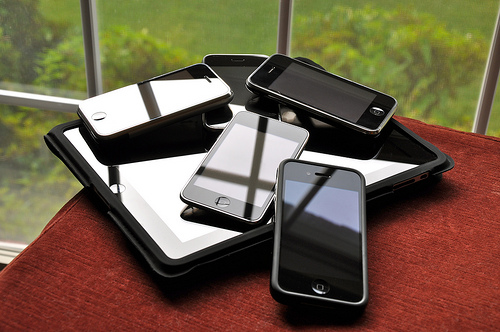Last chance to save on Digiday Publishing Summit passes is February 9

A new study by Harrison Group reveals astonishing growth in the demand for mobile technology across all frontiers and a resistance to intrusive, unsolicited advertising.
Since the advent of mobile communication technology people have been connecting with information, media and social networks without sacrificing their connectedness to a particular moment or social situation. In short, smartphones, tablets and e-readers, have given users freedom to choose the circumstances and the time in which a particular device becomes meaningful to their life.
Jim Taylor, the vice chairman of Harrison Group and the study’s author, comments that the report, highlights of which will be presented on May 14 at The Digiday Conference, supports the notion that tablets, smartphones, e-readers, as an extension of the laptop/desktop computer, have created wholesale change in the way most American families live, learn and relate to their environment. Sixty-one percent of online households own a digital device in addition to a laptop or desktop computer.
“Mobile technology has impacted consumers from the point of view of empowering them in how they look at the world, rather than access to others’ influence and persuasion,” said Taylor. “The digital world is a private world to the extent that it allows consumers to directly access the information they want.”
Mobile devices add to users’ quality of life by informing choice and individual resourcefulness, which gives marketers and publishers a compelling touchpoint to connect with consumers. The latest iteration of the landmark study “Devices, Consumption and the Digital Landscape 2012” reveals that consumers are resistant to traditional digital advertising, such as banner ads, on these devices yet are receptive to an integrated message through mobile apps, ads in digital magazines and above all in messaging that is tailored to them.
The study reveals a substantial divide between consumer preference and what marketers and publishers are doing to connect with them. Publishers and content providers are treating mobile devices as just another screen to display their message, while consumers view mobile devices as a resource to capture content that is largely used for recreation. The benefit of using mobile technology is that it offers a more streamlined content consumption experience for activities such as entertainment (reading ebooks/magazines, watching videos, and browsing favorite websites, etc.), shopping for goods and services, playing games, and communicating with a circle of friends, instead of laptops or desktops traditionally used at home. In contrast, Taylor notes, the laptop or desktop computer is the most important device for the creation of content and is where consumers are more receptive to digital advertising.
Successful marketers and publishers understand that a different approach must be taken to reach people on these devices, and the sooner they react to consumer preference, the better because demand for mobile technology is on the rise. The adoption rate of tablets has jumped from 5 percent in 2010 to 27 percent in 2012, with another 22 percent who expect to buy a tablet within the next year. Laptop purchase intent remains surprisingly strong with 9 percent of consumers who currently do not own, now planing to acquire one in the next year. Traditional computers remain the most important devices in terms of the amount of time spent engaging in digital activities, with tablets taking up less than 10 percent of the total time spent across devices, except for digital reading. A surprising 10 percent of current tablet owners expect to acquire an e-reader in the coming year. All of this speaks to the idea that people are assigning roles to the devices in their life: smartphones are predominantly a combination of telephone, personal networking and on-the-go access to information. Laptops remain the most important device in the creation of content while tablets and e-readers are devices that are utilized predominantly to consume content being drawn from personally curated entertainment and information sources. Consumers may be less inclined to engage with the advertising suggestions of marketers because their intent has evolved due to a sense of empowerment made possible by the organization and control they have over content consumption.
“Devices, Consumption and the Digital Landscape 2012” is a comprehensive study of the habits, behaviors and preferences of 1,800 computer literate Americans aged 18 and older, of whom 20 percent own a personal computer, a smartphone and a tablet (fondly referred to as the “digital elite”). In addition 1,200 businesses were surveyed on 65 dimensions of their strategic planning, integration of technology and concerns for the future of digital publishing, and include interviews from: 300 digital publishers, 300 advertisers, 300 information technology executives and 300 business managers. Interviews were conducted in January and February of 2012, with sampling error of three percent among consumers and five percent among the collective business survey.
The study will be introduced at The Digiday Conference in New York City on May 14, 2012 and will be available for purchase for $2,950 per copy. To get involved please visit www.DigitalRevolutionResearch.com or contact Christina Mount at Harrison Group (clmount@harrisongroupinc.com). Harrison Group, a YouGov America company, is a leader in market research and serves top B2B and B2C household brand names.
More from Digiday

GLP-1 draws pharma advertisers to double down on the Super Bowl
Could this be the last year Novo Nordisk, Boehringer Ingelheim, Hims & Hers, Novartis, Ro, and Lilly all run spots during the Big Game?

How food and beverage giants like Ritz and Diageo are showing up for the Super Bowl this year
Food and beverage executives say a Super Bowl campaign sets the tone for the year.

Brands invest in creators for reach as celebs fill the Big Game spots
The Super Bowl is no longer just about day-of posts or prime-time commercials, but the expanding creator ecosystem surrounding it.





